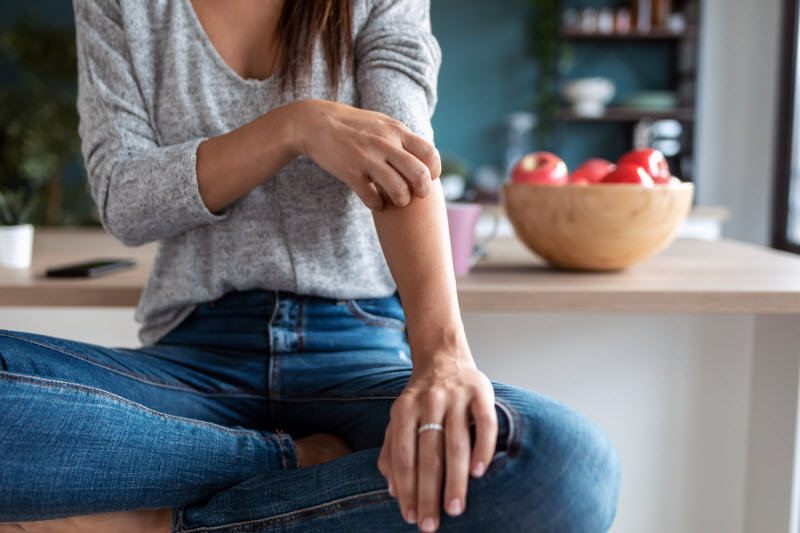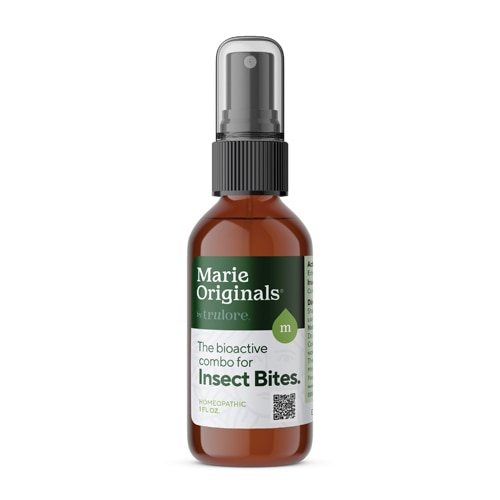[vc_row][vc_column][vc_column_text]There’s so much to love about
summer – abundant sunshine and
garden produce, hikes in the woods, trips to the beach – and then there are
bugs. All that glorious time outside unfortunately makes us more likely to get bitten or stung by insects.
Here’s what to do to help alleviate the pain and itch of those inevitable bites and stings.

Itchy bites and painful stings
When mosquitoes, gnats and other biting insects nibble on us, they inject an anticoagulant into our skin that allows blood to flow more freely. Our immune systems encounter this foreign substance and spring into action, releasing
histamine to bring white blood cells to the area to deal with the invader. The process causes swelling and itching at the site of the bite.
Other insect bites, such as those from bees and wasps, may hurt rather than itch, as their venom contains compounds that trigger our pain receptors.
Safety issues to note
Sometimes insect bites and stings can be more serious, transmitting diseases or causing allergic reactions.
Mosquitoes, for example, can carry
West Nile virus, which can cause fever and severe illness in some people.
Learn to identify and check for
ticks and be on the lookout for
signs of Lyme disease.
Can insect stings be life-threatening?
In some cases, yes. If someone develops hives, has swelling in the face, lips, or mouth, has trouble breathing, is dizzy, nauseous, or faints, call 911 immediately. If they have a known allergy and carry an epinephrine injector, ask if they need help injecting themselves.
Most bites and stings, however, are merely annoying and can be dealt with using some simple home remedies like those described below.
Home remedies for bug bites
First and foremost, don’t scratch insect bites, or you risk creating a sore that can become infected. Tapping or applying pressure can help trick your brain into ignoring the itch.
A cool compress with ice can help bring down swelling and numb the area around an insect bite. Other ingredients may help neutralize whatever is causing the area to itch or hurt.
There are loads of excellent
for bug bites to try. Many itch-relieving ingredients can be found in the kitchen or medicine cabinet, while others you can find when you’re out on the trail.
Tea bags
Green tea and
black tea contain anti-inflammatory compounds that can help relieve itch. Brew up some refreshing , then remove the tea bag and place on bites. Chilling the tea bags in the refrigerator can enhance their soothing effect.
Chamomile
Chamomile flowers also have anti-inflammatory properties considered useful for soothing bites. Try brewing some
chamomile tea and allow it to cool. Dab a little on affected areas for itch relief.
Honey
Honey has many uses as a home remedy. It’s an excellent skin soother and also has antiseptic properties, making it a natural option for soothing bug bites. Place a drop of
raw honey on your bite and reapply as needed.
Baking soda
Most of us have
baking soda in the kitchen for
baking and
cleaning, and it can easily be made into a simple paste that can help relieve both itchy bites and pain from bee stings.
Aloe
Soothing aloe is another go-to for all sorts of skin irritations. In addition to being a standby for
sunburns, aloe can make bites feel better, too. Keep some
aloe gel on hand, and you’ll be ready for whatever summer throws your way.
You can amp up aloe’s soothing effects with these
aloe vera ice cubes.
Witch hazel
Another anti-inflammatory,
witch hazel can soothe itch and promote healing. Dab a little on a soaked cotton ball and reapply as needed.
Apple cider vinegar
Some people find a drop of
ACV on a bite helps with itchiness, though it can sting a bit.
Common wild plants
Out on the trail? Keep an eye out for common wild plants like garlic mustard, plantain and jewelweed, which can be mashed up (or chewed) and applied to bites to help relieve itching. Just make sure to positively identify the plant beforehand!
How to treat stings
Stings from bees and wasps typically hurt rather than itch. When wasps and bees sting, they inject a small amount of venom into your skin, which is what causes pain and swelling around the area of the sting.
Though not common, insect bites and stings can transmit the spores that develop into tetanus bacteria, so it’s important to stay up to date on your tetanus booster, one of several
summer safety measures to take seriously.
What to do if you’re stung
First, wash the area with soap and water to remove venom as well as any dirt or bacteria that could lead to infection. If you see a stinger, try to remove it by scraping it with a fingernail. The
American Academy of Dermatology warns that removing stingers with a tweezer can squeeze the stinger and cause it to release more venom into your skin.
Applying ice wrapped in a cloth can help bring down swelling and alleviate pain. An
antihistamine can also help address your body’s histamine response.
The acidic venom of bees and yellow jackets can be neutralized using something alkaline, notably baking soda. Try applying a baking soda paste if you’re stung by one of these insects. Wasps’ venom, on the other hand, is slightly alkaline, and may respond better to a dab of vinegar.
A
soothing gel can help address discomfort from bites and stings, as can an
herbal spray.
How to repel biting and stinging insects
You can make it less likely that annoying bugs will find you by using a good insect repellent, whether it’s one you buy or
DIY. Here are some useful
tips for using insect repellent and more on
how repellents work (plus a DIY recipe).
Natural pest control strategies can help as well.
Be prepared this season with some simple ways to treat bites and stings and make the most of the joys of summer while limiting the nuisances that sometimes come with them.
[/vc_column_text][/vc_column][/vc_row][vc_row][vc_column][vc_text_separator title="Product Spotlight" border_width="2"][vc_row_inner][vc_column_inner width="2/12"][/vc_column_inner][vc_column_inner width="2/12"][/vc_column_inner][vc_column_inner width="3/12"][vc_single_image image="161386" img_size="full" onclick="custom_link" link="https://www.vitacost.com/marie-originals-bite-relief-spray"][/vc_column_inner][vc_column_inner width="2/12"][/vc_column_inner][/vc_row_inner][/vc_column][/vc_row]




